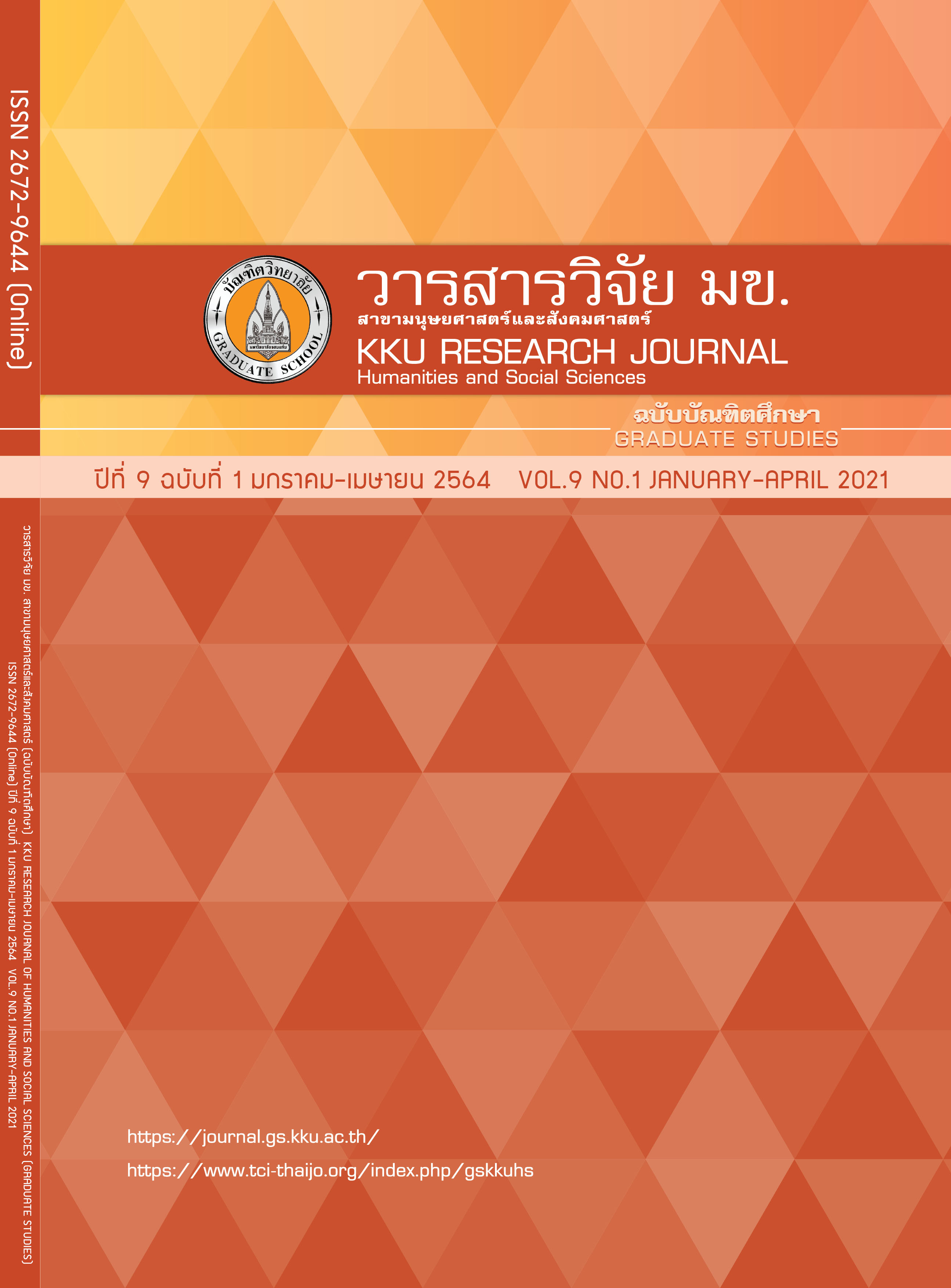ความเชื่ออำนาจควบคุม การสนับสนุนทางสังคม ความมุ่งมั่นในตนเองและการเรียนรู้โดยการนำตนเองของนิสิตมหาวิทยาลัยเกษตรศาสตร์ วิทยาเขตบางเขน
คำสำคัญ:
ความมุ่งมั่นในตนเอง, การเรียนรู้โดยการนำตนเองบทคัดย่อ
การศึกษาวิจัยนี้มีวัตถุประสงค์ 1) เพื่อศึกษาระดับความเชื่ออำนาจควบคุม การสนับสนุนทางสังคม ความมุ่งมั่นในตนเอง และการเรียนรู้โดยการนำตนเองของนิสิต 2) เพื่อศึกษาอิทธิพลของปัจจัยส่วนบุคคล ความเชื่ออำนาจควบคุม การสนับสนุนทางสังคมที่มีต่อความมุ่งมั่นในตนเองของนิสิต 3) เพื่อศึกษาอิทธิพลของปัจจัยส่วนบุคคล ความเชื่ออำนาจควบคุม การสนับสนุนทางสังคมที่มีต่อการเรียนรู้โดยการนำตนเองของนิสิต 4) เพื่อศึกษาความสัมพันธ์ระหว่างความมุ่งมั่นในตนเองกับการเรียนรู้โดยการนำตนเองของนิสิต กลุ่มตัวอย่างที่ใช้ในการศึกษาเป็นนิสิตมหาวิทยาลัย เกษตรศาสตร์ วิทยาเขตบางเขน ประจำปีการศึกษา 2561 จำนวน 703 คน เครื่องมือที่ใช้คือ แบบสอบถามวิเคราะห์ข้อมูล ผลการศึกษาพบว่า 1) ความเชื่ออำนาจภายในตน การสนับสนุนทางสังคมด้านอารมณ์ การสนับสนุนทางสังคมด้านข้อมูลข่าวสาร การสนับสนุนทางสังคมด้านเครื่องมือ มีอิทธิพลทางบวกต่อความมุ่งมั่นในตนเอง และสามารถอธิบายร่วมกันได้ร้อยละ 55.0 (R2= .550) 2) ความเชื่ออำนาจภายในตน การสนับสนุนทางสังคมด้านอารมณ์ การสนับสนุนทางสังคมด้านการประเมิน การสนับสนุนทางสังคมด้านเครื่องมือ มีอิทธิพลทางบวกต่อการเรียนรู้โดยการนำตนเอง และสามารถอธิบายร่วมกันได้ ร้อยละ 52.2 (R2= .522) 3) ความมุ่งมั่นในตนเองมีความสัมพันธ์ในระดับสูงกับการเรียนรู้โดยการนำตนเองของนิสิต อย่างมีนัยสำคัญทางสถิติ 0.01 และมีค่าสหสัมพันธ์ 87.2
เอกสารอ้างอิง
Ministry of Education. Educational Development Plan for Ministry of Education No.12(2017-2021) [Internet]. 2015 [updated 2018 Nov 1; cited 2019 Aug 10]. Available from https://www.moe.go.th/moe/th/news/detail. php?News ID= 47194&Key=news20. Thai.
Kasetsart University Council. 2554. Uniqueness and Identity of Kasetsart University [Internet]. n.d. [updated 2018 Jan 5; cited 2018 Sep 19]. Available from https://regis.ku.ac.th/identity/index.php?desp=1. Thai.
Knowles SM. Self-directed learning: A guide for learners and teachers. New York: Follett; 1975.
Himstra R. Self-directed learning. Oxford: Pergamon Press; 1994.
Ryan RM, Deci EL. Self-determination theory and the facilitation of intrinsic motivation, social development, and well-being. The American Psychological Association. 2000; 55(1): 68-78.
Rotter JB. Generalized expectancies for internal versus external control of Reinforcement Psychological Monographs. Journal of General and Applied. 1966; 80(1): 1-28.
Garrison DR. Self directed learning: Toward a comprehensive model. Adult Education Quarterly. 1997; 48(1): 18-29.
Brockett RG, Hiemstra R. Self-direction in Learning: Perspectives in Theory. London: Routledge; 1991.
Baron RA, Greenberg J. Behavior in Organization: Understanding and Managing the Human Side of Work. Toronto: Allyn and Bacon; 1990.
Mehrabian A. Beyond IQ: Broad-based measurement of individual success potential or “emotional Intelligence”. Journal of Genetic, Social, and General Psychology Monographs. 2000; 126(2): 133-239.
Brown GW. Meaning, measurement and stress of life events. In: Dohrenwend BS, Dohrenwend BP, editors. Stressful life events: their nature and effects. [n.p.]; 1974. p. 217-243.
Lakey B, Cohen S. Social support theory and measurement. New York: Oxford University Press; 2000.
Skager RW. Lifelong education and evaluation practice. Oxford: Pergamon Press; 1978.
Aiken LR. Personality, Theories, Research, and Application. New Jersey: prentice Hall; 1993.
Idsarawat S. Reserch report about characteristic Self – directed Learning of Thai. Bangkok: Mahidol University; 1995.
Teixeira PJ, Silva MN, Mata J, Palmeira AL, Markland D. Motivation, self-determination, and long-term weight control. International Journal of Behavioral Nutrition and Physical Activity. 2012; 9(1): 22.
Guglielmino LM. Development of the self-directed learning readiness scale. Dissertation Abstracts International. 1977; 38(11A): 6467.




